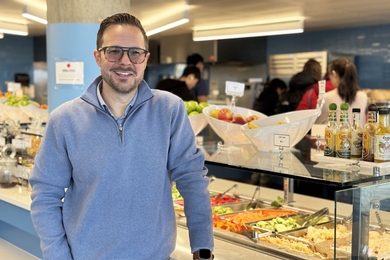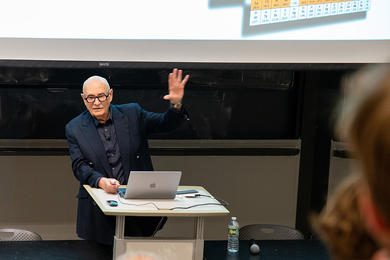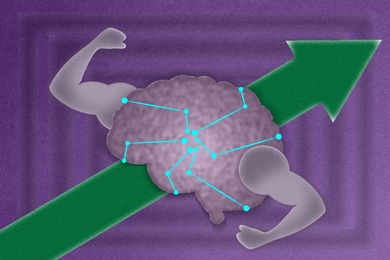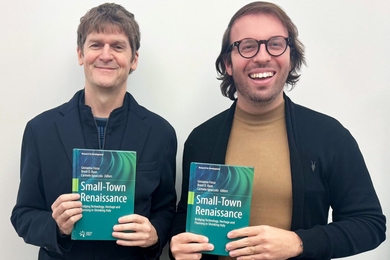His Highness the Aga Khan, MIT President Charles M. Vest and Harvard University President Lawrence H. Summers jointly launched the world's largest online resource on architecture, urbanism and landscape design in a ceremony at MIT on Sept. 27.
ArchNet provides users anywhere in the world with free access to an online library that draws upon more than 600,000 images focusing on the history and culture of design in the Muslim world. The site lets people interested in Islamic design initiate discussion, distribute research and share perspectives on the built environment. It also lets users share locally based resources and knowledge across borders and cultures.
Three years in development, ArchNet is supported by the Aga Khan Trust for Culture.
"The launch of ArchNet represents an exciting new initiative, a pioneering technological innovation, and a collaboration between leading educational institutions in the West and in the Muslim world to create greater understanding of the plurality of the Muslim world," Vest said. "We are profoundly grateful to the Aga Khan for allowing MIT to host ArchNet."
Characterizing ArchNet as "not only a means by which we share information on architecture and design, but also a very real attempt to build an architecture of understanding," the Aga Khan (Imam or spiritual leader of the Ismaili Muslims) emphasized the importance of locating the program at "an institution whose technological competencies would underwrite its capacity to serve decades into the future."
ArchNet is already being used by students, faculty and architects from eight countries where partner institutions contribute research, images, projects and monographs to the huge electronic repository. ArchNet partner schools currently include institutions in Egypt, India, Jordan, Lebanon, Malaysia, Pakistan and Turkey.
Seventy percent of Archnet's current users are under age 35, noted the Aga Khan, who described ArchNet as an "extraordinarily powerful resource at a global scale which will be an ongoing living encyclopaedia of knowledge for the younger generations in the Islamic world."
"ArchNet fulfils the original promise of the Internet," said Vest. "It provides accessibility to teaching resources that are currently unavailable to many universities, while creating a worldwide online community that is constantly enriching the contents of the catalog. Everyone benefits. At MIT, we benefit from the upload of unique resources from ArchNet partner schools, while schools around the world have the opportunity to choose teaching materials from the combined resources of MIT, Harvard, the Aga Khan Trust for Culture and other partner schools."
Concern for "the world in which all of our children will live," Summers said, "makes it essential for universities like Harvard and MIT to not just deepen our own understanding, but to deepen our contribution to the understanding of things Islamic, to truly globalize what we are all about, because there is very little else that is as important."
"As trustees of God's creation, we are instructed to seek to leave the world a better place than it was when we came into it," the Aga Khan said. "If ArchNet can help bring values into environments, buildings and contexts that make the quality of life better for future generations than it is today, it will have served its purpose."
"MIT has a distinguished history of educating design and planning professionals and working with institutions in the developing world," said Professor William Mitchell, dean of MIT's School of Architecture and Planning, through which ArchNet will be administered. "We are proud to continue this tradition through the support we offer ArchNet's electronic community."
A video that dramatized the optimistic and collaborative character of ArchNet followed the three speakers' presentations. Participants explored ArchNet during the reception that followed the remarks.
ArchNet is an example of MIT's OpenCourseWare initiative that makes course materials available on the web, free of charge, to any user anywhere in the world. Schools in the developing world suffer continuing cost pressures; the perennial lack of teaching materials; and very limited access to publications, images and research. ArchNet provides myriad ways of leap-frogging beyond cost or other constraints including the provision of hardware and software, training and infrastructure support.
A version of this article appeared in MIT Tech Talk on October 2, 2002.






